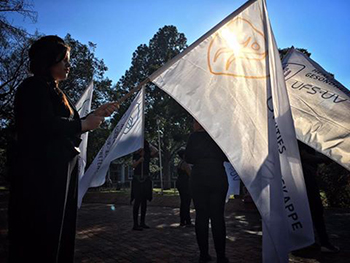
A total of 3681 qualifications, from seven different faculties, were conferred between 12 to 15 April 2016 at the University of the Free State Autumn Graduations on the Bloemfontein Campus.
Photo: Evert Kleynhans |
Photo Gallery
Graduation Video Clip
“You cannot let your legacy stop here. Use your qualifications to change the life of others.”
This was the call from Dr Muavia Gallie, a guest speaker at one of the Autumn Graduations on the Bloemfontein Campus of the University of the Free State (UFS). He is a School-Turnaround strategist and educational activist.
He was the speaker on 12 April 2016 at the Faculty of Education graduation ceremony in the Callie Human Centre. According to Dr Gallie and other speakers at the graduations, graduates need to use their qualifications for the good of South Africa.
A diverse group of graduates
A total of 3681 qualifications were conferred in seven faculties between 12 and 15 April 2016, the week of ceremonies comprising eight sessions. It was four days of festivities with friends and families gathering to celebrate with graduates.
The large number of graduates consisted of a diverse group. According to Dr Khotso Mokhele, Chancellor of the UFS, the group passing with distinctions was also much more diverse than in past years, especially in the number of female students.
Prof Jonathan Jansen, Vice-Chancellor and Rector of the UFS, said graduation ceremonies remain the most special days on the UFS calendar.
A total of 22 students from the Center for Universal Access and Disability Support also graduated during the week.
Work for next generation
Sello Hatang, the speaker on 12 April 2016 at the Faculties of Health Sciences, Law, and Theology ceremony, echoed Dr Gallie’s sentiments; “As you leave this university, your work begins for the next generation; to serve the people you care about in any way possible,” said Hatang, the Chief Executive of the Nelson Mandela Foundation.
Other speakers included Dawie Roodt, the most referenced economist in the media in 2015, at the ceremony of the Faculty of Economic and Management Sciences on 14 April 2016. The speaker on 15 April 2016 at the ceremony of the Faculty of Humanities was Nikiwe Bikitsha, one of South Africa’s leading journalists and broadcasters.
Achievers
In the Faculty of Natural and Agricultural Sciences, Madri Brink (Baccalaureus Scientiae Agriculture) received a Senate Medal for the best four-year Baccalaureus degree, while Kyla Hayter (Baccalaureus Scientiae Honores) won the Senate Medal for the best Honours student at the UFS. Willem Carel Brink from the Faculty of Humanities received a Senate Medal for the best three-year Baccalaureus Degree.
Deans’ medals awarded by the UFS.
Also see videos of the respective guest speakers:
Dr Muavia Gallie
Sello Hatang
Dawie Roodt
Nikiwe Bikitsha